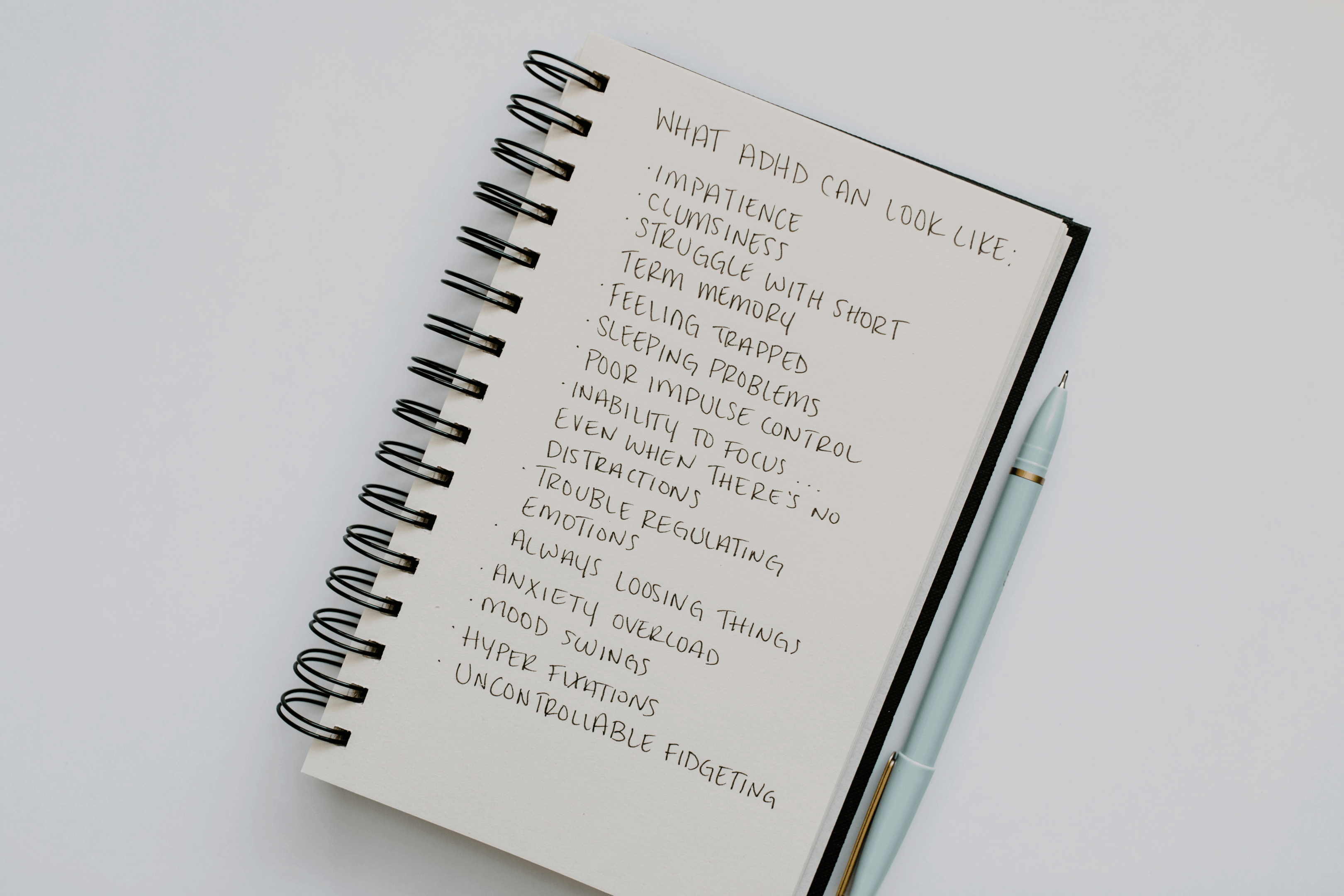How To Manage Procrastination with ADHD
Procrastination & ADHD. How do you deal with it?
Mowing the lawn only takes up to half an hour, while folding and putting away the laundry takes merely five minutes. But not for people who put off these tasks for days on end. Some even find themselves reaching for the phone, the TV remote or even doing the dishes every time they remember this pending, oft-postponed task. Does this seem familiar at all to you?
If yes, don't worry. What you're facing is procrastination, a common condition that affects almost everyone in everyday life.
But has someone ever told you that it may be a sign of a bigger, more serious condition, like ADHD?
Before you start to worry, you should remember that internet doctors are only self-qualified – they may not be aware of the nuances they claim to be speaking about. In other words, just because common perception links procrastination with ADHD symptoms, this does not mean you have ADHD.

What is attention deficit hyperactivity disorder (ADHD)? Who is affected by it?
Attention deficit hyperactivity disorder (ADHD) is a common neurodevelopmental disorder that can affect people of all age groups.
It is usually caused due to genetic disposition, i.e., you are born with it. In common parlance, ADHD is characterized as a condition where the person with attention deficit has difficulty focusing, is overly active displays impulsive behavior, or is easily distracted.
While the condition is often diagnosed in childhood itself, adults can present it as well. According to the US National Institute of Mental Health (NIMH), the prevalence of ADHD among adults is 4.4%. It is not unusual for the condition to go undiagnosed and untreated in adults.
What are the indications of ADHD?
Inattention
This is an inability to stay on task, sustain focus, or keep your work and activities organized. Basically, you are unable to give your full focus to one task at a time and find your mind thinking four steps ahead or planning for other goals simultaneously.
Hyperactivity
This is a constant urge to move around, fidget, tap your hands or feet, or play with some object. Some people with ADHD also tend to experience phases when they talk too loudly or quickly. It's merely a manifestation of your body wanting to get rid of nervous energy.
Impulsivity
This is a tendency to make decisions or act without fully considering the consequences, due to a lack of self-control or the desire for immediate gratification. In some cases, it also is avoidance behavior that involves abandoning a task already underway to take up something else. For example, you may be attempting to finish your homework, but then suddenly find yourself rearranging your closet and trying to find that favorite pen of yours that seems to have disappeared. If you've started several projects that you then abandoned (do you have a half-written manuscript for your novel? A painting course you bought but did not complete?) this might be familiar.
It's very important to note here that these ADHD symptoms are not a clear indication of the condition, and you cannot self-diagnose even if you relate to one or more of them. ADHD can and should only be diagnosed by a mental health professional with relevant qualifications!

The Link between the Two – Procrastination, ADHD
Is procrastination one of the ADHD symptoms?
Now we know what ADHD is presented as, but what we're here to understand is its relationship with everyday procrastination. There is a lot of debate among healthcare professionals and researchers on whether the two are linked at all. But as of now, science says that procrastination is not an officially identified ADHD symptom. Rather, studies conclude that procrastination may be an effect of ADHD-linked behaviors.
For instance, in December 2014 scientists in the Netherlands surveyed some undergraduate college students with ADHD to understand which of its factors (inattention, hyperactivity, impulsivity) correlated with procrastination. They found that only inattention correlated with procrastination, rather than impulsivity, as they expected.
Procrastination happens due to a variety of reasons, including a fear of failure, having more fun things to do, or simply a lack of motivation. According to some studies, procrastination is often a compensation strategy for people with ADHD. It gives them a way to stop dealing with a challenging or unpleasant task that they feel requires a long period of undivided focus.
Difference between normal/chronic procrastination and ADHD
Severity
Analysis of normal procrastination and chronic procrastination, and symptoms of ADHD should keep in mind how severely the former presents itself. Procrastination can be at a normal or chronic level without reaching a point where the person can't bear to do anything at all, ever.
Other symptoms
As studies show, procrastination is not strongly associated with all the other symptoms of ADHD. So before determining the link to procrastination, get professional advice!
Want to know more about why you procrastinate? Try our quiz here!
Effects of ADHD-related procrastination
So now we know that procrastination, especially academic procrastination, is not a direct symptom of ADHD. But, the two do have a link. There are many ways in different forms in which the link manifests itself:
Organization and planning issues
ADHD is closely linked to an impairment in executive functioning skills, such as self-control, organization of work, making and sticking to to-do lists, completing tasks, time management, etc. To fix these issues, what you need is motivation -- and professional help -- to take control of your work and life. But on the other hand, if you're also putting off any of these tasks like making schedules and figuring out your time availability, chances are that the organization that you need is never going to happen.
Problems getting started
A person with ADHD and procrastination might find it difficult to get started on any task, especially if the task isn't particularly interesting or easy to do. So, you push it for as long as possible.
Getting easily distracted and sidetracked
Even if a task is started, internal and external stimuli can often force you to get distracted easily or move your attention to something more interesting, thus putting off the task further.

Impaired sense of time
Letting distractions creep in or leaving deadlines open and disorganized can lead to a person with ADHD-related procrastination struggling with keeping track of time, with work piling up and days going by before they even realize it.
Last-minute propulsion
When people find they work better under pressure, they try to enter situations with a sense of urgency. Similarly, those with ADHD-related procrastination leave things till the last minute as a way to get them done as emergencies. But this doesn't always work--you can either leave yourself with too little time, or find yourself forever waiting for the urgent motivation to appear.
Sense of paralysis/overwhelm
Sometimes a challenging task is so unappealing that you only associate with negative feelings and negative moods. Or, if you have been put it off for so long, you simply can't get yourself to do it. When just thinking about it brings up dread, fear, frustration, and so avoidance takes control – you may be experiencing ADHD Shutdown.
Fear of failure
People who strive for perfection always are instilled with a fear of failure, and so tend to avoid dreadful tasks that have been put off for so long that approaching them seems to be the hurdle.
Tips to manage ADHD, procrastination
Now we know the adverse impacts that ADHD-related procrastination can have. Here are some tips to manage them:
Set deadlines
Procrastination gets easier if there is no due date to get the next task or work done. So even if a task does not come with a deadline, set one for it and hold yourself to it!
Also, when you do sit down to set up desired outcomes, don't spend hours running every possibility and consequence in your mind. Just get working, and deal with the obstacles as and when they come up.
Tip: Use our SMART Goal Generator to make sure the goal is formulated well – including having a deadline – to give yourself the best chance of success!
Don't multitask
Multitasking is the bane of productivity. Not only does it eat up chances of progress on important goals, or larger goals across multiple tasks, but it leaves more room for completely neglecting the work that should be done on certain tasks in favor of other things. If you have trouble focusing on just one thing at a time, try the monk mode approach.
Break up large projects
If your goal is to write a research report, set aside one day for just research, second for reading, and so on. Going step by step will help build momentum and make sure you're getting on track.
Does the research itself seem too big to do at once? No problem! The first goal can just be to save relevant links from the website. Then you choose to read just one of them at a time. Starting tiny will make the mountainous task seem doable.
Want some tips on breaking down bigger goals? Try our unique tool Crunch, for help with Task Initiation!
Use to-do lists
There are plenty of calendars, daily planners, and time-boxing templates to help with organization. All you have to do is note down your tasks in an order that makes sense and find a to-do system that helps you stay focused.
Be realistic about your time management
If a task will take you three hours, don't give yourself two to do it. Figure out how to optimize your work and time management, to make sure work is actually being done and you're not just mindlessly crossing off tasks or hours without making any progress.
Also, sometimes with ADHD, even having everything written isn't enough. So set reminders based on deadlines to give you an idea of what you should prioritize for the day.
Several well-designed ADHD apps can help you with time management as well.

Design your work environment to work for you
Make sure the space you're working in is free of noise and distractions, and keeps you comfortable and alert.
For example, don't place yourself in a room with lots of people, TV, or music, all at once. Make sure the environment is one where you can limit distractions and are able to work at peace.
Try to follow consistent routines
Putting yourself in situations that encourage you to work, relax, take breaks or even be distracted at specific times helps you get into work mode on time every day. So make a daily routine that starts with a morning warm-up, a planning hour, and deep, focused work sessions. At the end of the work day, set up a wind-down routine too, which can include turning off work devices, exercises, and freshening up for the evening.
But on days when you are feeling tired or sick, don't force yourself to put in a full day of work and stick to your daily routine. Go by your fluctuating energy levels; don't work against them, or they'll go against you!
Reward yourself
For every step finished, give a small reward to yourself a quick pat on the back, a chocolate, or whatever else makes you happy as a small reward to keep up the motivation. Bigger milestones can lead to bigger rewards too!
Don't punish yourself
If you didn't meet your goal for the day, don't beat yourself up. Just take the positives and figure out how to make the next day better.
And even if you completely derail and have an unproductive day, don't let it get to you. Try to shake off the careless mistakes and push forward, so as to move towards success.
Build in physical activity
In between tasks, make sure you're stretching your legs, going out in the sun, or doing something physical to keep your body energetic and mind fresh. But don't get carried away on your run and forget the work you need to return inside for!
Spend time with people you love
Don't let work isolate you! Being social and putting yourself in a place with positivity is important for your mental health and also for you to maintain a healthy work-life balance.
Get accountability
Have someone check up on you to ensure you're getting work done! A friend, colleague, coach or, of course – Boss as a Service!
Here's an article we wrote specifically about getting an ADHD accountability buddy!
How Boss as a Service can help manage ADHD, procrastination
We keep track of your work: Managing procrastination and getting everyday tasks in life organized is not easy, so leave it to your assigned boss to make note of your goals.
We help you break down goals: Dividing large goals into measurable steps can feel overwhelming, so come to us for brainstorming, or use our tool, Crunch!
We remind you of things to be done: Things you deem tedious will not escape from our attention! We'll make sure your to-do list is updated and bug you till you get things done.
We make sure you’re realistic: Through conversations and questions, we like to get a sense of what you're working on and how achievable it seems, so we know you're planning well.
We make sure you're well: Your mental health and well-being is the most important to us, so we aim to make sure you are performing tasks without impacting your personal relationships or well-being or hampering the desired outcome!
Final thoughts
ADHD is a serious but manageable condition, as is procrastination. But don't get disheartened or start to worry if you're diagnosed with either. There are ways to manage both and lead a productive, happy life!